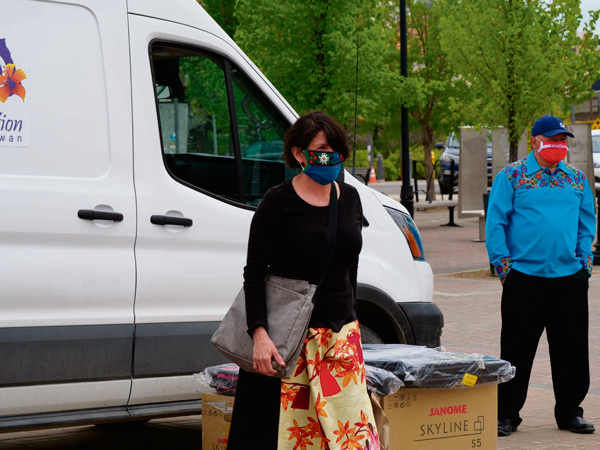
A group of Saskatchewan women known as the Masked Makers are sewing and distributing thousands of cloth masks to protect vulnerable populations from COVID-19.
Some seamstresses, though, have spent hours using decades-old sewing machines that would skip a stitch or need constant adjusting so the thread wouldn’t bundle up.
The Métis Nation of Saskatchewan (MN-S) decided that needed to change.
On May 29, it gifted the Masked Makers equipment and supplies—including 15 industrial-style sewing machines—to help make the process a little bit easier.
Métis lawyer Angela Bishop, who’s from Green Lake, began sewing masks when the virus first made its way into the province. When she started, it took 30 minutes to make a single mask, so she reached out to 14 others to see if they wanted to contribute.
“We’ve never used the fact that we don’t have (new equipment) as an excuse not to do the work that we want to do, which is to protect our communities,” said Bishop.
“Hopefully once people learn how to use these (new machines), because they’re so used to working with older machines, we will be able to work smarter and not harder,” she added.
“I’m very proud of the group and I’m happy not just for us, but for the recipients of our masks.”
So far, the Masked Makers have distributed 5,000 masks across the province, but particularly in the northwest. That area has been dealing with a cluster of COVID-19 cases, attributing to the majority of cases across Saskatchewan.
Bishop said the communities receiving their masks include Green Lake, Beauval, English River First Nation, Buffalo Narrows, Buffalo River Dene Nation, Turnor Lake and Pinehouse.
They receive several individual requests, but have sent bulk orders to someone in the communities, such as a mayor, to distribute.
The group has also sent masks to community organizations in the south, such as AIDS Saskatoon and Saskatoon Family Services.
“It’s no small accomplishment,” said Bishop.
“Everyone’s volunteering their time, they make masks for free. We get donations for materials, nobody is allowed to accept cash.”
Bishop had the intention from the beginning to only use high quality materials. This includes polypropylene fabric, a material used in procedure masks, and strong thread. Bishop said sometimes they’ll add a cotton cover because the material is less subject to fraying and adjusts to your body temperature.
The Masked Makers are currently distributing about 500 masks per week, but the group makes more than that. Bishop said they’re going to start stockpiling some in preparation for a potential second wave of COVID-19.
According to a news release, MN-S President Glen McCallum and MN-S Health Minister Marg Friesen have been watching the seamstresses’ stories unfold.
“I know the frustrations with working with old equipment,” said Minister Friesen, a sewer herself.
“Not one complaint from any of the sewers, and no one gave up.”
“Wearing face masks in public places is a part of the new normal and the work this group of selfless sewers is doing, helping protect our vulnerable citizens and mitigate the spread of COVID-19 in our communities, is to be commended.”
While she started the group, Bishop emphasized that the Masked Makers’ success is also due to the other participants, who are mostly Indigenous. She hopes that someday the women are able to meet without having to distance themselves from each other.
“You have to have the right people to work with. People who trust you, people who are willing to kind of work as a team,” said Bishop.
“It’ll be nice when they’re all able to sit together in the same room and meet one another.”

